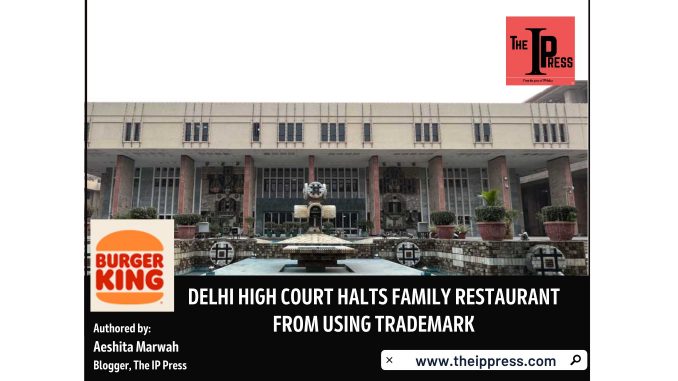

Burger King Co. LLC v. Virendra Kumar Gupta[1], is a trademark infringement case that was filed in the Intellectual Property Division of the Delhi High Court. Burger King Co. LLC, a multinational fast-food chain, filed a rectification petition against Virendra Kumar Gupta, who owns a family restaurant in New Delhi named “Burger King”. The case revolves around the use of the “BURGER KING” trademark by the family restaurant.
Burger King Co. LLC, which owns the “BURGER KING” trademark globally, has been operating in India since 2014. In 2015, it applied for the registration of the “BURGER KING” trademark in India, which was granted in 2017. The company operates over 200 restaurants across India, and its brand is well-known in the country.
In 2021, Burger King Co. LLC learned that Virendra Kumar Gupta was operating a family restaurant named “Burger King” in the city of New Delhi. The company claimed that the use of the “BURGER KING” trademark by the family restaurant was causing confusion among consumers and diluting the distinctive character of the brand. Burger King Co. LLC filed a rectification petition with the Delhi High Court, seeking to remove the registration of the “Burger King” trademark owned by Virendra Kumar Gupta. The company argued that the registration of the trademark was obtained fraudulently and that it was causing confusion among consumers.
The Delhi High Court, after hearing the arguments presented by both sides, issued an order staying the use of the “BURGER KING” trademark by the family restaurant until further notice. The court also directed the Registrar of Trademarks to conduct an investigation into the registration of the trademark owned by Virendra Kumar Gupta. The case highlights the importance of protecting intellectual property rights and the potential consequences of infringing on trademarks. It also underscores the need for businesses to conduct comprehensive research before adopting a brand name or logo to avoid infringing on existing trademarks.
Background of the trademark
The Burger King trademark is a well-known and valuable asset for the Burger King brand. It was first registered in the United States in 1963 by the Miami-based fast-food chain Burger King Corporation. The trademark is known for its distinctive logo featuring the words “Burger King” in bold letters with a blue and orange colour scheme.
Over the years, the Burger King trademark has been the subject of several legal disputes. In 1996, the company filed a lawsuit against a small restaurant in Mattoon, Illinois, which had been using the name “Burger King” since the 1950s. The case was settled out of court, with the local restaurant agreeing to change its name to “The Original Burger King.”
In India, Burger King has faced legal challenges to its trademark rights. The company has been involved in disputes with local restaurants attempting to use the “Burger King” name. However, the recent decision in the Burger King Co. LLC v. Virendra Kumar Gupta case serves as a reminder of the importance of protecting trademarks from unauthorized use.
Burger King India filed an IPO in 2020 to raise funds for expansion in the country. The company plans to use the funds to open new restaurants and expand its presence in India, where it faces intense competition from other fast-food chains.Bottom of Form
Analysis of the case
The Delhi High Court had to determine whether the use of the “BURGER KING” trademark by Virendra Kumar Gupta’s family restaurant constituted trademark infringement and dilution of the distinctive character of the mark owned by Burger King Co. LLC.
The case revolved around the registration of the “Burger King” trademark by Virendra Kumar Gupta and whether the registration was obtained fraudulently. Burger King Co. LLC argued that the use of the “BURGER KING” trademark by the family restaurant was causing confusion among consumers and diluting the distinctive character of the brand. The company sought to remove the registration of the “Burger King” trademark owned by Virendra Kumar Gupta.
The Delhi High Court, after hearing the arguments presented by both sides, issued an order staying the use of the “BURGER KING” trademark by the family restaurant until further notice. The court also directed the Registrar of Trademarks to conduct an investigation into the registration of the trademark owned by Virendra Kumar Gupta.
In the Burger King Corporation v. Ranjan Gupta[2] case, the Delhi High Court had to determine whether the use of the “Burger King” trademark by a local Indian restaurant constituted trademark infringement and passing off of the mark owned by Burger King Corporation.
The court observed that Burger King Corporation had obtained the registration of the “Burger King” trademark in India, and the mark was well-known in the country. The court held that the local Indian restaurant’s use of the mark was likely to cause confusion among consumers and dilute the distinctive character of the mark owned by Burger King Corporation.
The Delhi High Court in the Burger King Co. LLC v. Virendra Kumar Gupta case cited the Burger King Corporation v. Ranjan Gupta case to support its argument that the registration of the “Burger King” trademark by Virendra Kumar Gupta’s family restaurant was likely to cause confusion among consumers and dilute the distinctive character of the mark owned by Burger King Co. LLC.
The court noted that the Burger King Corporation v. Ranjan Gupta case had established the principle that the use of a well-known trademark by an unauthorized person is likely to cause confusion among consumers and dilute the distinctive character of the mark. The court also observed that the Burger King Corporation v. Ranjan Gupta case had held that the adoption of a mark with the intention of misleading consumers was fraudulent.
In its decision, the Delhi High Court noted that the registration of the “Burger King” trademark by Virendra Kumar Gupta was prima facie fraudulent. The court observed that the family restaurant was not using the trademark in good faith and had adopted the mark with the intention of misleading consumers.
The court relied on various precedents to support its decision. In particular, it referred to the case of N.R. Dongre v. Whirlpool Corporation and Ors.[3], where the Supreme Court of India held that a person who is not the registered proprietor of a trademark cannot claim to be an honest concurrent user of the trademark.
The court also referred to the case of Marico Limited v. Agro Tech Foods Limited[4], where it was held that the registration of a trademark could be canceled if it was obtained fraudulently or by misrepresentation.
Conclusion
The Delhi High Court’s decision in the Burger King Co. LLC v. Virendra Kumar Gupta case serves as a reminder that the unauthorized use of a well-known trademark by an individual or entity can lead to infringement and passing off claims. The court’s decision is a victory for Burger King Co. LLC, which has successfully defended its trademark rights in India. The decision highlights the importance of registering trademarks and taking necessary steps to protect them from unauthorized use.
Trademark protection is critical for businesses, particularly in the food and beverage industry, where competition is fierce. The use of a well-known trademark by a local restaurant or individual can lead to confusion among consumers, dilute the distinctive character of the mark, and cause financial harm to the rightful owner of the mark
[1] Burger King Co. LLC v. Virendra Kumar Gupta, 2023 SCC OnLine Del 2292.
[2] Burger King Corporation v. Ranjan Gupta, 2018 SCC OnLine Del 11484
[3] N.R. Dongre v. Whirlpool Corporation and Ors., (1996) 5 SCC 714.
[4] Marico Limited v. Agro Tech Foods Limited, (2008) 145 DLT 729.


Aeshita Marwah
Author
Aeshita Marwah is a third-year law student at the University of Petroleum and Energy Studies with a strong passion for labor laws and intellectual property matters. She is an avid reader and researcher who is always up-to-date with the latest legal issues from around the world. Her research work is characterized by her dedication to thoroughness, analytical rigor, and innovative thinking. Her commitment to labor laws is driven by a desire to promote fair and equitable treatment of workers, while her fascination with intellectual property matters is driven by her appreciation for creativity and innovation. With her unwavering determination and passion for the law, Aeshita is poised to make a significant impact on the legal profession.
- SEO Powered Content & PR Distribution. Get Amplified Today.
- PlatoAiStream. Web3 Data Intelligence. Knowledge Amplified. Access Here.
- Minting the Future w Adryenn Ashley. Access Here.
- Buy and Sell Shares in PRE-IPO Companies with PREIPO®. Access Here.
- Source: https://www.theippress.com/2023/05/12/delhi-high-court-halts-family-restaurant-from-using-burger-king-trademark/



